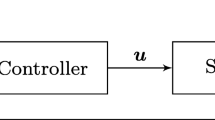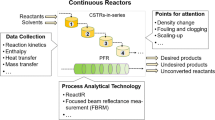Abstract
This paper presents a novel design technique of H-infinity based temperature and molar concentration controller for the highly non-linear system, namely continuous stirred tank reactor (CSTR). Model uncertainties and perturbation in CSTR parameters are considered in the proposed design. The stability, robustness, disturbance rejection capability, sensitivity to the parameter variations, and speed of the proposed controller are investigated through time and frequency response, complementary, and worst-case sensitivity analysis. Further, performances of the proposed controller are compared with the other existing controllers to reveal its effectiveness and accuracy. It is shown that, the proposed controller provides better time- and frequency-responses characteristics along with high disturbance rejection capability than the other existing controllers. The rise time, peak overshoot, and settling time of the proposed controller are found smallest among the conventional and AI based controllers and are 0.14 s, 0, and 0.6 s, respectively. Further, performance indices of the proposed controller are also found smaller than the other existing controllers. Also, the magnitude of sensitivity and complementary sensitivity functions is found in the desired limit under worst condition. Proposed control is found proficient to control the other parameter, such as molar concentration control, also.
















Similar content being viewed by others
Data Availability
Data sharing not applicable to this article as no datasets were generated or analysed during the current study.
Code Availability
The authors declare all data and materials as well as software application or custom code support their published claims and comply with field standards.
References
Yepes, A. G., Freijedo, F. D., Lopez, Ó., & Doval-Gandoy, J. (2011). Analysis and design of resonant current controllers for voltage-source converters by means of Nyquist diagrams and sensitivity function. IEEE Transactions on Industrial Electronics, 58(11), 5231–5250.
Sung, H.-K., & Hara, S. (1988). Properties of sensitivity and complementary sensitivity functions in single-input single-output digital control systems. International Journal of Control, 48(6), 2429–2439.
Ding, S., Chen, W., Mei, K., & Murray-Smith, D. J. (2020). Disturbance observer design for nonlinear systems represented by input–output models. IEEE Transactions on Industrial Electronics, 67(2), 1222–1232.
Liu, L., Liu, Y., & Tong, S. (2019). Fuzzy-based multierror constraint control for switched nonlinear systems and its applications. IEEE Transactions on Fuzzy Systems, 27(8), 1519–1531.
Alshammari, O., Mahyuddin, M. N., & Jerbi, H. (2019). An advanced PID based control technique with adaptive parameter scheduling for a nonlinear CSTR plant. IEEE Access, 7, 158085–158094.
Zhou, W., Liu, H., He, H., Yi, J., & Li, T. (2019). Neuro-optimal tracking control for continuous stirred tank reactor with input constraints. IEEE Transactions on Industrial Informatics, 15(8), 4516–4524.
Huaguang, Z., & Cai, L. (2002). Nonlinear adaptive control using the Fourier integral and its application to CSTR systems. IEEE Transactions on Systems, Man, and Cybernetics, Part B (Cybernetics), 32(3), 367–372.
Perez, M., & Albertos, P. (2004). Self-Oscillating and Chaotic behavior of a PI-controlled CSTR with control valve saturation. Journal of Process Control, 14(1), 51–59.
Shu, X., Rigopoulos, K., & Cinar, A. (1989). Vibrational control of an exothermic CSTR: Productivity improvement by multiple input oscillations. IEEE Transactions on Automatic Control, 34(2), 193–196.
Zhang, T., Feng, G., Liu, H., & Lu, J. (2009). Piecewise fuzzy anti-windup dynamic output feedback control of nonlinear processes with amplitude and rate actuator saturations. IEEE Transactions on Fuzzy Systems, 17(2), 253–264.
Xie, L., Su, H., Lu, S., & Xie, L. (2018). Linear mismatched model-based offset-free MPC for nonlinear constrained systems with both stochastic and deterministic disturbances and its application to CSTR. IEEE Access, 6, 69172–69184.
Rastegar, S., Araújo, R., Sadati, J., & Mendes, J. (2017). A novel robust control scheme for LTV systems using output integral discrete-time synergetic control theory. European Journal of Control, 34, 39–48.
Khairy, M., Elshafei, A. L., & Emara, H. (2010). Exponential stability based design of constrained fuzzy predictive control. European Journal of Control, 16(1), 28–48.
Ramirez, H., Maschke, B., & Sbarbaro, D. (2013). Modelling and control of multi-energy systems: An irreversible port-Hamiltonian approach. European Journal of Control, 19(6), 513–520.
Aldemir, A. (2018). PID controller tuning based on phase margin (PM) for wireless temperature control. Wireless Personal Communications, 103(3), 2621–2632.
Pamela, D., & Godwin Premi, M. S. (2017). Wireless control and automation of hot air temperature in oven for sterilization using fuzzy PID controller and adaptive smith predictor. Wireless Personal Communications, 94, 2055–2064.
Rehan, M., Hashmi, S. W. A., Aamir, M., Safwan, M., & Alvi, B. A. (2015). Designing and implementation of industrial process control and monitoring system using fuzzy PID and WSN. Wireless Personal Communications, 85, 483–498.
Zva, M., Mészáros, A., Klemeš, J., & Oravec, J. (2012). Robust and optimal control approach for exothermic reactor stabilization. Theoretical Foundations of Chemical Engineering, 46, 740–746.
Zames, G. (1981). Feedback and optimal sensitivity: Model reference transformations, multiplicative seminorms and approximate inverses. IEEE Transactions on Automatic Control, 26(2), 301–320.
Hosseini Dolatabadi, M., Nazari Monfared, M., & Fakharian, A. (2013). Robust H-infinity control for the pH neutralization process based on fuzzy models. In 13th Iranian conference on fuzzy systems, Qazvin (pp. 1–6).
Yang, F., Gani, M., & Henrion, D. (2007). Fixed-order robust h∞ controller design with regional pole assignment. IEEE Transactions on Automatic Control, 52(10), 1959–1963.
Moradi, H., Saffar-Avval, M., & Bakhtiari-Nejad, F. (2012). Sliding mode control of drum water level in an industrial boiler unit with time varying parameters: A comparison with H∞-robust control approach. Journal of Process Control, 22(10), 1844–1855.
Bazanella, A. S., Pereira, L. F. A., & Parraga, A. (2017). A new method for PID tuning including plants without ultimate frequency. IEEE Transactions on Control Systems Technology, 25(2), 637–644.
Lorenzini, C., Bazanella, A. S., & Pereira, L. F. A. (2018). PID tuning based on forced oscillation for plants without ultimate frequency. IFAC-Papers OnLine, 51(4), 131–136.
Cohen, G., & Coon, G. (1953). Theoretical consideration of retarded control. Transactions of the ASME, 75(1), 827–834.
Ziegler, J. G., & Nichols, N. B. (1942). Optimum settings for automatic controllers. Transactions of the ASME, 64, 759–768.
Lopez, A. M., Miller, J. A., Smith, C. L., & Murrill, P. W. (1967). Tuning controllers with error-integral criteria. Instrumentation Technology, 14(11), 57–62.
Mhankale, A. E., Paul, A. B., & Chavan, G. B. (2017). Robust control analysis using μ-synthesis for nonlinear control system. In International conference on smart grids, power and advanced control engineering (ICSPACE) (pp. 155–163).
Elgazzar, M., & Shamekh, A. (2020). Performance comparison of MPC and PID in CSTR process control. In 6th International conference on engineering and MIS 2020 (ICEMIS'20) (pp. 1–6).
Wayne Bequette, B. (2002). Behavior of a CSTR with a recirculating jacket heat transfer system. In The American control conference, 2002, Anchorage, AK, USA (pp. 3275–3280).
Zimenko, D., Polyakov, A., Efimov, D., & Kremlev, A. (2016). Feedback sensitivity functions analysis of finite-time stabilizing control system. International Journal of Robust and Nonlinear Control, 27(15), 2475–2491.
Gu, D.-W., Petkov, P. H., & Konstantinov, M. M. (2013). Modeling of uncertain systems. In robust control design with MATLAB®. Advanced textbooks in control and signal processing. Springer.
Bingi, K., Ibrahim, R., Karsiti, M. N., & Hassan, S. M. (2017). Fuzzy gain scheduled set-point weighted PID controller for unstable CSTR systems. In IEEE international conference on signal and image processing applications (ICSIPA) (pp. 289–293).
Poornima, R., Malathi, S., Narayani, T., Sobana, S., & Panda, R. C. (2015). Identification of temperature of a dicumyl peroxide reaction process in CSTR. In IEEE technological innovation in ICT for agriculture and rural development (TIAR) (pp. 171–176).
Sundari, S., & Nachiappan, A. (2017). Decoupling based control analysis of a continuous stirred tank reactor (CSTR). In International conference on innovative research in electrical sciences (IICIRES) (pp. 1–5).
Prakash Verma, O., Kumar, S., & Manik, G. (2015). Analysis of hybrid temperature control for nonlinear continuous stirred tank reactor. In Fourth international conference on soft computing for problem solving. Advances in intelligent systems and computing (Vol. 336, pp. 103–121).
Rani, V. A., Prabhakaran, D., & Thirumarimurugan, M. (2020). Design of robust controllers for a continuous stirred tank reactor. Tierärztliche Praxis, 40, 2338–2349.
Saini, P., Kumar, R., Sharma, P., & Rajput, N. (2017). Design and comparative analysis of controllers for continuous stirred tank reactor (CSTR). In International conference on intelligent communication, control and devices. Advances in intelligent systems and computing (Vol. 479, pp. 351–364).
Saini, P., Gaba, S. K., Rajput, N., & Aggarwal, A. (2016). Design and analysis of controllers for continuous stirred tank reactor (CSTR). In 3rd IEEE international conference on computing for sustainable global development (INDIACom) (pp. 2778–2784).
Funding
The authors declare that no funds, grants, or other support were received during the preparation of this manuscript.
Author information
Authors and Affiliations
Contributions
Conceptualization, writing software code, writing-original draft preparation: PS, Methodology, writing software code, preparation of final draft, data curation: PT.
Corresponding author
Ethics declarations
Conflict of interest
The authors declare that they have no known competing financial interests or personal relationships that could have appeared to influence the work reported in this paper.
Additional information
Publisher's Note
Springer Nature remains neutral with regard to jurisdictional claims in published maps and institutional affiliations.
Rights and permissions
About this article
Cite this article
Saini, P., Thakur, P. H-Infinity Based Robust Temperature Controller Design for a Non-linear Systems. Wireless Pers Commun 126, 305–333 (2022). https://doi.org/10.1007/s11277-022-09746-3
Accepted:
Published:
Issue Date:
DOI: https://doi.org/10.1007/s11277-022-09746-3




